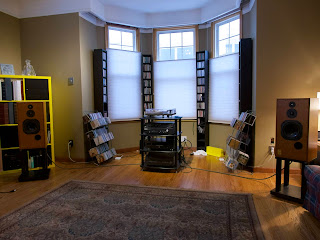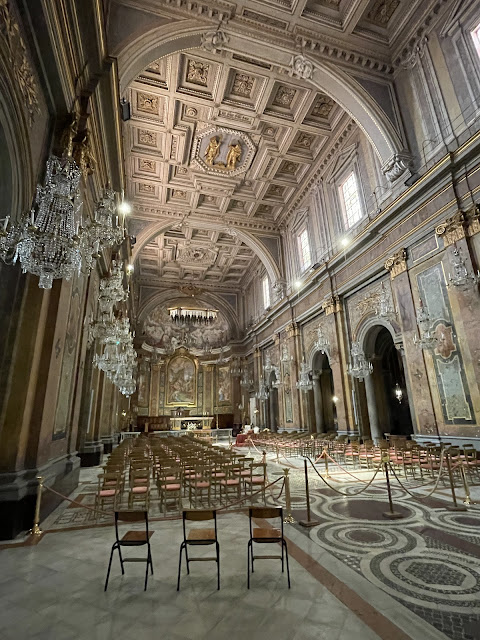Music & Technology
Music as long as we are talking about the use of instruments rather than the human voice has always been a technical exercise. Instruments need to be made. Even found objects need to be compared with one another. Kids love to experiment with banging different sizes and shapes of pots, for example. Even with the human voice, however, technology has been applied from very early times.
Ancient theatres employed walls and materials above the performers of ancient dramas (which often employed a chorus) to help project the human voice. The shape of the theatre itself is also very important. We see this same attention to natural acoustics in the design of concert spaces and theatres meant for the performance of opera.
 Until the advent of electrical magnification of sound many public spaces paid attention to the need to project sound. The band stands and band shells that dotted our parks in North America a century ago were constructed with the purpose of aiding the broadcast of acoustic music. Go into some older churches and you may find elevated pulpits. Virtually all will have a roof above the preacher, not to hide him or protect him from the weather inside church but help project the voice. I've seen ingenious ones which have a clamshell shaped roof, suspended and with a counter-weight to allow it to be raised and lowered to optimize the projecting effect taking into account the height and timbre of the speaker.
Until the advent of electrical magnification of sound many public spaces paid attention to the need to project sound. The band stands and band shells that dotted our parks in North America a century ago were constructed with the purpose of aiding the broadcast of acoustic music. Go into some older churches and you may find elevated pulpits. Virtually all will have a roof above the preacher, not to hide him or protect him from the weather inside church but help project the voice. I've seen ingenious ones which have a clamshell shaped roof, suspended and with a counter-weight to allow it to be raised and lowered to optimize the projecting effect taking into account the height and timbre of the speaker.
Instruments also, although mass manufactured are still in significant numbers hand-produced. I wonder if "instrument maker" is something young people consider as a career these days. There are a few requirements of course -- perfect pitch and dexterity being two of them.
In pianos, for example, the technical aspect of a piano's construction plays a very significant role in the piano's overall tone and its relative ability to distinguish and blend the sounds that it makes. The success of the action has much to do with how well the piano may be played quietly (hence the name "piano" = "soft" or "in a low voice").
Technology is used widely now including the digital alteration of singing voices to put them back on pitch. At what point does this become manufactured? Certainly we need to ask ourselves why we listen to music. If it is simply something to block out quiet or it is to merely be able to say that I listen to what others listen to, then I think it is prone to a lot of manipulation that can take something that has rather direct access to our hearts and minds and put it to less than human uses.
Music is an expression that is profoundly shared between the artist producing the sound, the instrument maker, those who support the work of the artist in sound amplification and recording and those who listen.
As listeners and consumers of music, we need to be careful. Just as we are what we eat, we reflect more than we realize what we listen to.
Ancient theatres employed walls and materials above the performers of ancient dramas (which often employed a chorus) to help project the human voice. The shape of the theatre itself is also very important. We see this same attention to natural acoustics in the design of concert spaces and theatres meant for the performance of opera.
 Until the advent of electrical magnification of sound many public spaces paid attention to the need to project sound. The band stands and band shells that dotted our parks in North America a century ago were constructed with the purpose of aiding the broadcast of acoustic music. Go into some older churches and you may find elevated pulpits. Virtually all will have a roof above the preacher, not to hide him or protect him from the weather inside church but help project the voice. I've seen ingenious ones which have a clamshell shaped roof, suspended and with a counter-weight to allow it to be raised and lowered to optimize the projecting effect taking into account the height and timbre of the speaker.
Until the advent of electrical magnification of sound many public spaces paid attention to the need to project sound. The band stands and band shells that dotted our parks in North America a century ago were constructed with the purpose of aiding the broadcast of acoustic music. Go into some older churches and you may find elevated pulpits. Virtually all will have a roof above the preacher, not to hide him or protect him from the weather inside church but help project the voice. I've seen ingenious ones which have a clamshell shaped roof, suspended and with a counter-weight to allow it to be raised and lowered to optimize the projecting effect taking into account the height and timbre of the speaker.Instruments also, although mass manufactured are still in significant numbers hand-produced. I wonder if "instrument maker" is something young people consider as a career these days. There are a few requirements of course -- perfect pitch and dexterity being two of them.
In pianos, for example, the technical aspect of a piano's construction plays a very significant role in the piano's overall tone and its relative ability to distinguish and blend the sounds that it makes. The success of the action has much to do with how well the piano may be played quietly (hence the name "piano" = "soft" or "in a low voice").
Technology is used widely now including the digital alteration of singing voices to put them back on pitch. At what point does this become manufactured? Certainly we need to ask ourselves why we listen to music. If it is simply something to block out quiet or it is to merely be able to say that I listen to what others listen to, then I think it is prone to a lot of manipulation that can take something that has rather direct access to our hearts and minds and put it to less than human uses.
Music is an expression that is profoundly shared between the artist producing the sound, the instrument maker, those who support the work of the artist in sound amplification and recording and those who listen.
As listeners and consumers of music, we need to be careful. Just as we are what we eat, we reflect more than we realize what we listen to.

